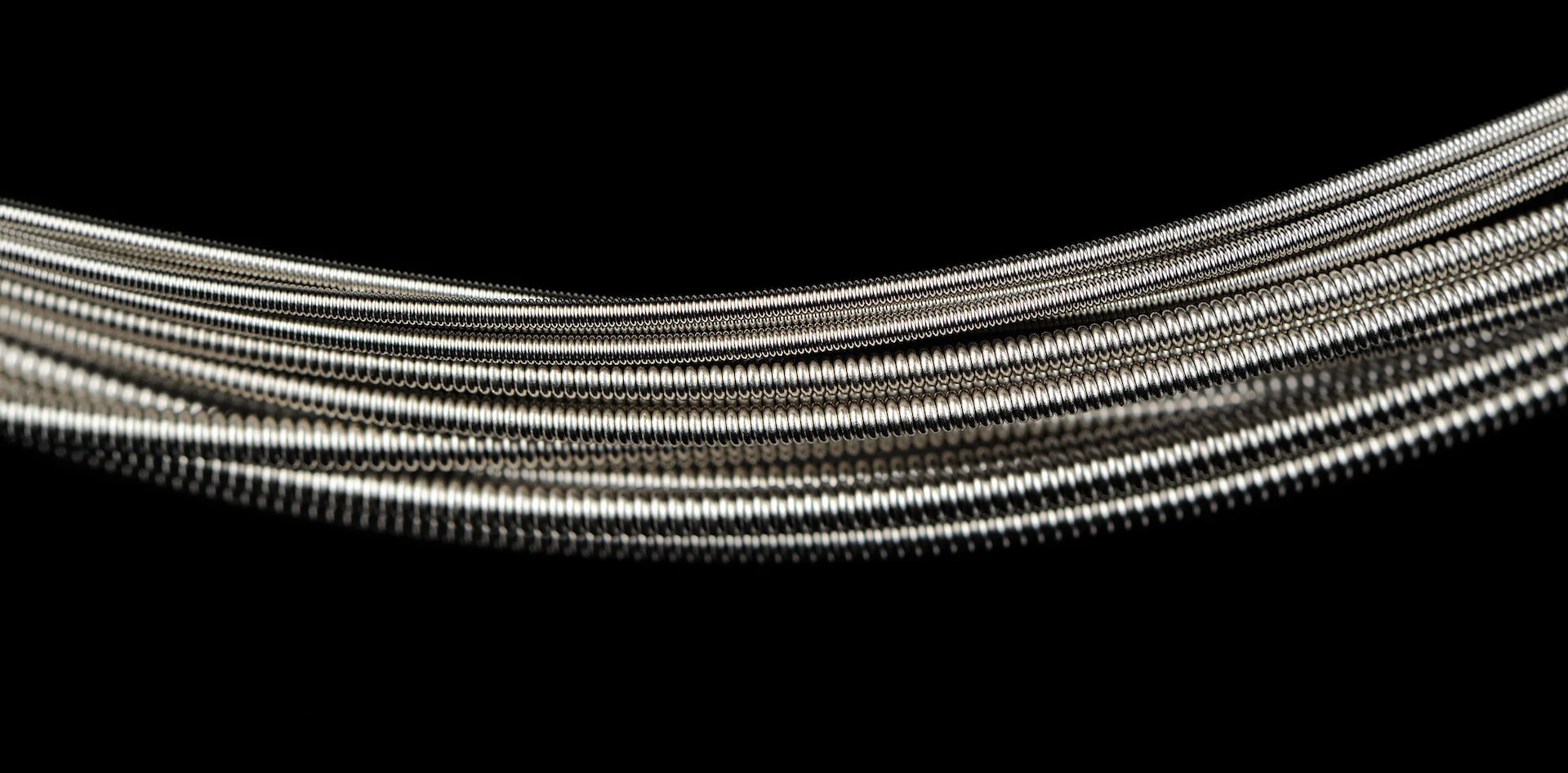Try Different Strings
Guitar strings have come a long way from the old days of cat gut as found on old style classical guitars. Gut strings are now replaced by nylon, what used to be only steel has moved to significant advances in construction and coatings have reached the level where we achieve increased string life, without compromising string tone.
Many guitar players don’t even think about strings. Many rarely change their strings at all, and then wonder why their guitar doesn’t sound the same.
Strings go dead. That’s life. The Second Law of Thermodynamics says that entropy always increases. Translated into English, this means that stuff falls apart. To see entropy in real life, look at a patch of rust. Entropy is increasing chaos, which can be seen in decay, and a change in the state of a material. Entropy is natural and unavoidable, and impacts guitar strings like everything else.
This means that we should be changing our strings. Noted guitarist J.P. Cormier has stated on many occasions that a set of strings lasts him no more than two shows. He says he is an aggressive player, uses very flat picks and metal finger picks and that is natural finger oils are very acidic. All these things contribute to string death, but so does how the strings are made.
There are all manner of string makers out there, from big commercial companies, to rebranders, to small makers. A big company would be exemplified by D’Addario or Ernie Ball. A small maker would be Curt Mangan or Stringjoy. Some, like John Pearce, only do uncoated acoustic strings. Others only do coated strings such as Elixir.
When I was young LaBella were the strings to get. Mostly because the small shop that I could get to on my bike only had those. There was a line for while called Nashville Straights whose claim was that strings should be kept straight not wound into a circle to fit into a package. In recent times we have encountered myriad different materials, coatings and magic dust all purporting to give better string life and better tone.
So in all this chaos, how do you find strings that work for you?
Try Different Strings
Strings are inexpensive. Relative to the price of a guitar, a set of new strings costs very little indeed. By trying different makers you will find a build that works very well for you and likely one that you like best. Best is a relative thing of course and will change over time. I no longer hunt for LaBella .008s for my first Les Paul.
In addition to makers and coatings, there are different core shapes including round core and hex core. Try them both and see which you like better.
You will also find different materials that sound different. Maybe. Try and find out. High end strings cost about the same as four Starbucks fancy coffees so the investment is very small. Simple basic strings are less than the price of two of those coffees.
Different musical styles may benefit from different string finishes. Flatwound strings are often preferred by jazz players because they are warmer and may squeak less as you slide around. Round wounds can be brighter and more favoured by rock and pop players. On my ES-335 I use half-rounds, which my guitar tech hates but I like the mid flavour between rock and jazz.
What Happens
Sometimes you find a string that you love. Every Taylor guitar that I own, came with Elixirs, as did all my Boucher acoustics. Many people love Elixirs but they get furry very quickly under my fingers and I find that they deaden quickly, so I do not buy them. That’s fine for me. I tried Rotosound Tapewounds on my D’Angelico Excel and I hate the tone and the feel, yet Rotosound makes strings that other players love to death. On electrics, I have found that D’Addario NYXL strings or my own signature Curt Mangan strings work best for me, although I will try others on a regular basis. For a long time, on acoustics, I would only use Curt Mangan Monel strings or in a pinch Martin Retro Monel strings. 80/20 bronze or phosphor bronze would die in not time on me and always sounded like the top end ran away from home. I recently discovered D’Addario XS acoustic strings which are a new coated phosphor bronze and I have already upgraded three guitars to them because they sound and feel great.
Maker Brand Strings
With great respect to Fender and Gibson, I have yet to open the case on a new guitar from either maker and not want to cut the factory strings off immediately. Whether they make their own strings is immaterial to me, they sound cheap and feel like grit. They never last on my guitars. I find that the stock strings on Martin guitars are the same. I really love the sound of my Martin SC-13E but what saved it was removing the horrible to my ear factory strings and changing them. This was the first guitar that got a set of the new D’Addario XS strings and it is even better than it was before (it had D’Addario XT acoustic strings most recently).
My only exception to immediately replacing factory strings are the strings that come on PRS guitars. I do not know where PRS gets their strings made, but they are silky smooth, hold tune extremely well and last a long time.
Don’t let factory strings sway you off an otherwise nice instrument and if you feel as I do, when you buy a guitar, ask your dealer to put on a set of decent strings from a proper string maker in a gauge that you like and know. What someone else recommends, may not be right for you.
Conclusions
Great strings can change an ok guitar. A string change will bring back what you loved initially about your guitar all else being equal. The strings that you stuck to ten years ago, or maybe even two years ago may not be your best option today. Or perhaps they still are. The only way to find the best strings for you is to try different strings. Thanks for reading and until next time, peace.

